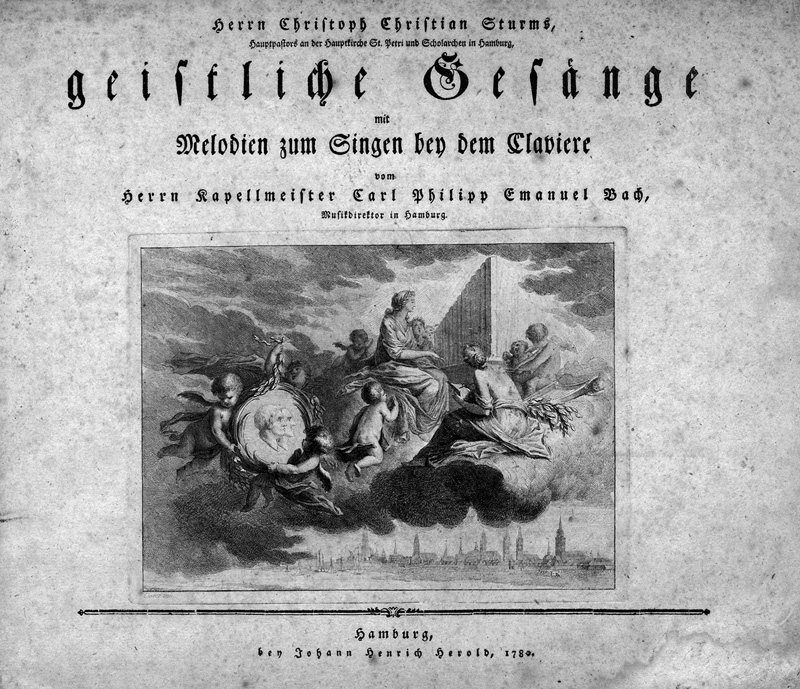BACH, Carl Philipp Emanuel (1714-1788). Autograph letter signed ('Bach') to the composer Johann Christoph Kühnau in Berlin, Hamburg, 23 November 1784, one page, 4to , integral address leaf, with a fine impression of Bach's monogrammed seal in red wax (seal tear). Provenance : collection of Dr Warner Pölchau, Hamburg; Walter R. Benjamin Autographs, New York, December 1956, catalogue 12, vol LXIX.
BACH, Carl Philipp Emanuel (1714-1788). Autograph letter signed ('Bach') to the composer Johann Christoph Kühnau in Berlin, Hamburg, 23 November 1784, one page, 4to , integral address leaf, with a fine impression of Bach's monogrammed seal in red wax (seal tear). Provenance : collection of Dr Warner Pölchau, Hamburg; Walter R. Benjamin Autographs, New York, December 1956, catalogue 12, vol LXIX. ON AVOIDING CONSECUTIVE FIFTHS. Emanuel Bach writes to his fellow composer on the nuances governing this solecism: 'Since your 5ths do not directly follow one another, and the note which covers them is NB not a passing or fast note (fast notes in Allabreve are quavers), no one can reject them. In my Heilig this case has the advantage of the tempo Adagio. In the Passion [i.e. the Passion Cantata, H.776], the crotchet rest causes the 5ths not to follow one another directly '; Kühnau's defence of ninth chords against Herr Fasch ('dieser brave Mann') is correct, and Bach expresses his surprise that Fasch should object to this position of the ninth which is particularly common in well-constructed counterpoint works, and this not out of fancy, but from necessity ('diesen in starken u. gearbeiteten Wercken sehr sehr oft vorkommenden u. zwar nicht aus Wollust, sondern aus Noth vorkommenden Satz'); Bach refers to his own defence of the same case in the second (1780) edition of his Versuch über die wahre Art das Clavier zu spielen ('Meine Vertheidigung stehet in meinem 2ten Versuch ... '); the letter concludes with discussion of a bill for music which Bach had sent a few months previously, asking that it be settled soon. No. 258 in the Letters , tr. Stephen C. Clark (1997), where it is described as 'lost'.
BACH, Carl Philipp Emanuel (1714-1788). Autograph letter signed ('Bach') to the composer Johann Christoph Kühnau in Berlin, Hamburg, 23 November 1784, one page, 4to , integral address leaf, with a fine impression of Bach's monogrammed seal in red wax (seal tear). Provenance : collection of Dr Warner Pölchau, Hamburg; Walter R. Benjamin Autographs, New York, December 1956, catalogue 12, vol LXIX.
BACH, Carl Philipp Emanuel (1714-1788). Autograph letter signed ('Bach') to the composer Johann Christoph Kühnau in Berlin, Hamburg, 23 November 1784, one page, 4to , integral address leaf, with a fine impression of Bach's monogrammed seal in red wax (seal tear). Provenance : collection of Dr Warner Pölchau, Hamburg; Walter R. Benjamin Autographs, New York, December 1956, catalogue 12, vol LXIX. ON AVOIDING CONSECUTIVE FIFTHS. Emanuel Bach writes to his fellow composer on the nuances governing this solecism: 'Since your 5ths do not directly follow one another, and the note which covers them is NB not a passing or fast note (fast notes in Allabreve are quavers), no one can reject them. In my Heilig this case has the advantage of the tempo Adagio. In the Passion [i.e. the Passion Cantata, H.776], the crotchet rest causes the 5ths not to follow one another directly '; Kühnau's defence of ninth chords against Herr Fasch ('dieser brave Mann') is correct, and Bach expresses his surprise that Fasch should object to this position of the ninth which is particularly common in well-constructed counterpoint works, and this not out of fancy, but from necessity ('diesen in starken u. gearbeiteten Wercken sehr sehr oft vorkommenden u. zwar nicht aus Wollust, sondern aus Noth vorkommenden Satz'); Bach refers to his own defence of the same case in the second (1780) edition of his Versuch über die wahre Art das Clavier zu spielen ('Meine Vertheidigung stehet in meinem 2ten Versuch ... '); the letter concludes with discussion of a bill for music which Bach had sent a few months previously, asking that it be settled soon. No. 258 in the Letters , tr. Stephen C. Clark (1997), where it is described as 'lost'.






Testen Sie LotSearch und seine Premium-Features 7 Tage - ohne Kosten!
Lassen Sie sich automatisch über neue Objekte in kommenden Auktionen benachrichtigen.
Suchauftrag anlegen